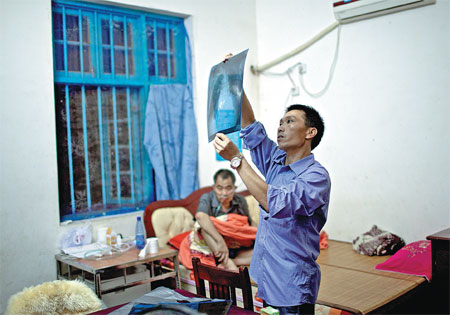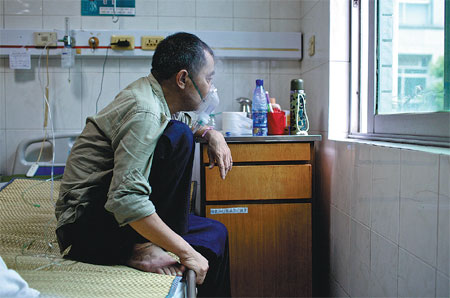Helping them breathe
Updated: 2014-10-01 14:50
By Cang Wei(China Daily USA)
|
||||||||
Workers hit by dust-related lung disease need more support, reports Cang Wei in Wuxi, Jiangsu.
Wang Mingsheng feels like he is suffocating all the time. He kneels several times a day, giddy and gasping for air.
"Every breath tortures me," Wang said. "I would've killed myself long ago if I didn't have a son."
Wang, 34, lives in Xiangyang village of Zhen'an county in Shaanxi province. He was diagnosed in 2004 with pneumoconiosis, which is caused by inhaling large amounts of dust.
Wang contracted the lung disease after working in a gold mine together with his fellow villagers. Sixty out of the village's 200 families have members diagnosed with the disease. More than 30 people have died.
Wang recalled that when he drilled holes for hours every day in the gold mine, no protective masks were provided to him, nor were dust suppression measures taken.
"We could only see each other's cap-lamp vaguely when we were working, even if we stood just 1 meter away," Wang said.
"My nostrils were always filled with dust after a day's work."
Wang suffers from third-stage pneumoconiosis, which has no effective treatment and cannot be cured. He used to weigh 74 kilograms but has lost one-third of his body weight since he was diagnosed with the disease.
Among the six members of Wang's family, only two are healthy - his son and his younger brother's son. Wang's father and younger brother also contracted the lung disease. His mother was diagnosed with colon cancer, and both brothers' wives have left the family.
"I cannot imagine the future," Wang said. "I have no future."
There are at least 6 million patients like Wang Mingsheng in the country, said Wang Keqin, who is the founder of Love Save Pneumoconiosis. The NGO, considered the largest of its kind in China, helps migrant workers like Wang Mingsheng who suffer from the occupational disease.
"Pneumoconiosis is caused by inhaling large amounts of dust, which can result in the compaction and fibrosis of the lungs after it enters the lung cells," Wang Keqin said.

"Most patients diagnosed with third-stage pneumoconiosis cannot lie on the bed to sleep, because less than one-quarter of their lungs, which can still provide them with limited oxygen, will stop working if they lie down.
"About 22 percent of the patients will die. Many of them die in a kneeling position, in pain," Wang said.
"Every hour in China, 1.5 patients diagnosed with black lung disease, caused by coal dust, suffocate to death. Most of them are aged between 30 and 40."
Wang Liangxu, a member of the thoracic department under the Chinese Medical Doctor Association, said that black lung patients always have difficulty breathing.
"If complications develop following their breathing difficulty, the patients will experience heart and lung failure which is usually the cause of their death," Wang said.
Pneumoconiosis is divided into three distinct stages. Patients suffering from the first and second stages can receive lung lavage to ease their symptoms.
But there is no effective treatment for terminal patients in China.
According to Love Save Pneumoconiosis, every year 20,000 people contract the disease in the country.
Statistics from China's National Health and Family Planning Commission showed that in 2013, 26,000 occupational disease cases were reported to the government, among which 87 percent were diagnosed with pneumoconiosis.
Chen Jingyu, an expert of respiratory diseases with Wuxi People's Hospital in East China's Jiangsu province, once told Wang Keqin an astonishing story.
"Some workers who used to work for gold mines left unexpected gifts to their family members after they were cremated. Though their bones had turned into ashes, the traces of gold left in their lungs melted into a whole piece."
"Due to financial problems, many patients who could have received relief from their ailment died before they could get the necessary medical help," Chen said.
"I feel extremely sad when some young people die of the disease."
Compared with pneumoconiosis patients who work for State-owned enterprises, migrant workers, most of whom are not covered by insurance, lead a much harder life when they contract the disease.
"Those workers of State-owned enterprises have the country to cover all their medical expenses," Wang Keqin said.
"They are fully covered for the treatment, receive compensation and enjoy recuperation in sanitariums that lasts three to six months every year."
"I've seen such workers who managed to live for 50 years after they were diagnosed with pneumoconiosis in their 30s. But migrant workers aren't that lucky. Most of them cannot even get compensation."
Under China's Law on the Prevention and Treatment of Occupational Diseases, three requirements must be met if the workers are confirmed to be suffering from the occupational disease - there must be employment contracts, employers' or three colleagues' testimony that thick dust exists in the work environment, and employers' application for the identification of the disease, Wang Keqin said.
Wang said the requirements were "nonsense".
"How can you expect those irresponsible enterprises to apply for the identification and pay the requisite compensation? Many patients feel that they have been abandoned by the country and by society."
A survey conducted by the Chinese Academy of Social Sciences in 2008 also showed that less than 5 percent of China's migrant workers signed contracts with their employers.
"The migrant workers contracting pneumoconiosis are even more vulnerable than those infected with AIDS," Wang said.
"Many AIDS patients have the ability, the platform and the channel to voice their demands because they come from different social classes. But the migrant workers only come from one social class - the lowest. They cannot voice their hardships and needs, so they get no attention and help."
Song Changxing, a 44-year-old pneumoconiosis patient, has spent about 200,000 yuan ($32,600) to treat his disease. His former workplace paid him less than 80,000 yuan after local police and the labor department participated in the negotiations for his compensation.
Song used to work for Kunshan Zhongrong Metal Products Co Ltd, where an explosion triggered by thick dust in its wheel-polishing workshop on Aug 2 claimed at least 75 lives and injured 185 others.
He started to suffer from nosebleeds and vomited large amounts of blood before he was diagnosed.
"I need help but I don't know how I can get it," Song said.
To help such migrant workers, Love Save Pneumoconiosis has taken them to hospitals, provided oxygenators to the patients and publicized the harmful effects of thick dust.
"We noticed that many workers knew nothing about pneumoconiosis even when they were diagnosed with it," said Wang Xiaoxiao, an employee of the NGO.
"We hope the publicity can make them more aware of the harm that the dust can cause.
"We also provide counseling to alleviate their psychological problems. We not only want them to be healthy physically, but also psychologically."
The NGO has six full-time workers in Beijing and Hangzhou, more than 4,000 volunteers and 36 branches across the country.
But Wang Xiaoxiao admitted that she might not work for the NGO for a long time.
"Most employees get only 3,000 yuan a month. I'm single now and I can live with that. But after I get married and have a baby, I cannot support my family with such a salary."
In a report on the living conditions of China's migrant workers with pneumoconiosis, issued by the NGO in July, it suggested that every migrant contracting pneumoconiosis should be covered by occupational injury insurance, whether they buy insurance or not.
It also said that a special fund should be set up by the country, and that enterprises should take more responsibility to protect the rights of migrant workers.
Wang Liangxu from the Chinese Medical Doctor Association said that dust suppression measures must be taken in enterprises and mines, and that strict operational regulations must be followed.
"Workers should have physical examinations regularly and tuberculosis prevention work must be enhanced in dust-related workplaces."
"An NGO's effort is far from enough," Wang Keqin said. "Strict regulations and laws must be made to prevent those irresponsible enterprises from harming the migrant workers."
In Wang Keqin's micro blog, he mentioned many times the story of a little boy who sends dying fish back into the ocean.
Numerous fish left on the beach by the ebb tide lie gasping and dying, but the boy can only throw them into the ocean one by one. Some people laugh at the boy, saying that his efforts are meaningless. Nobody cares what he does.
The boy answers as he throws a fish back into the sea: "This fish cares, and that fish also cares."
"We cannot save all of them," Wang said.
"But saving one is better than none."
Contact the writer at cangwei@chinadaily.com.cn
|
Xu Xinsheng, a patient of pneumoconiosis in Leiyang of Hunan province, examines lung scans of Xu Zhihui, another sufferer of the disease, on Aug 23, 2013. Xu Zhihui developed the lung disease after working the pneumatic drill in a factory in Shenzhen, Guangdong province. Photos by Zhou Gangfeng / for China Daily |
|
Xu Zhihui developed several other complications including tuberculosis while he was working in the factory. |
|
NGO Love Save Pneumoconiosis volunteers talk about the lung disease to Shenzhen residents at a charity exhibition in September 2013. Provided to China Daily |
(China Daily USA 10/01/2014 page6)

 Visitors trade cash for luck at World Heritage site
Visitors trade cash for luck at World Heritage site Sharapova beats Kvitova to win China Open
Sharapova beats Kvitova to win China Open
 China-Mexico ties deepen
China-Mexico ties deepen
 58 couples say 'I do' among the clouds
58 couples say 'I do' among the clouds
 Chinese convoy fleet executes escort missions in Gulf of Aden
Chinese convoy fleet executes escort missions in Gulf of Aden
 Chinese FM Wang Yi meets with Mexican president
Chinese FM Wang Yi meets with Mexican president
 China leads medal table as Asian Games close
China leads medal table as Asian Games close
 Highlights at Paris auto show
Highlights at Paris auto show
Most Viewed
Editor's Picks

|

|

|

|

|

|
Today's Top News
HK officials resume work as protests thin
Brazil's Rousseff to face Neves in rival in runoff
Some protesters in HK decide to withdraw
China startups 'get smart' about healthcare devices
US, India stir S. China Sea debate
Brazilians more aware of breast cancer symptoms, survey finds
Ebola patient in Dallas struggling to survive, says CDC head
Ebola could reach France and UK
US Weekly

|

|










